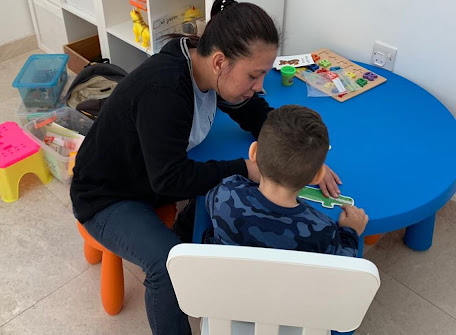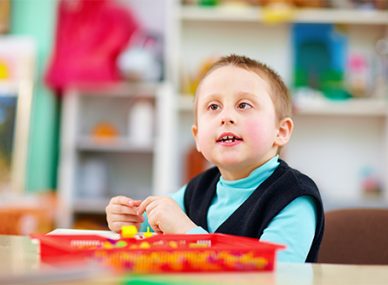Autism Spectrum Disorder (ASD) is a type of behavioral disorder that can be hard to diagnose or is discovered later in life. The disease’s difficult diagnosis also makes therapy challenging, remarkably when signs and symptoms have progressed in severity.
Causes of Autism in Children
There is no exact cause of Autism; however, recent research has demonstrated that there is no single cause behind ASD. Some of the suspected risk factors for this disorder are as follows:
● Autistic family member
● Reduced birth weight
● Imbalances in metabolism
● Genetic mutations
● Genetic disorders or fragile X syndrome
● Children of older parents
● Exposure to environmental toxins (heavy metals)
● Exposure of the fetus to the medications (Thalomid)
Types of Autism
There are 5 significant types of autism that a child can have are described below:
● Asperger’s Syndrome
Asperger’s syndrome is a neurodevelopmental disability in which the patient has difficulty in socializing and body language and confined and repeated behavior patterns and activities.
● Pervasive development disorder-not otherwise specified (PDD-NOS)
This developmental disorder is a collection of disorders characterized by delays in the growth of socializing and communication skills. Parents may notice signs as early as infancy, while the average age of onset is before three.
● Kanner’s Syndrome
This kind of autism is also referred to as Classic Autistic Disorder. Its signs include difficulties speaking or understanding others, little or no eye contact, and sensitivity to scent, light, sound, taste, or touch.
● Rett Syndrome
Rett syndrome is referred to as a neurological condition that manifests itself in infancy. The condition affects females more than males. The disorder causes difficulties in every facet of a child’s life. With adequate care, your child can still live a happy life. As a family, assist the child in doing what they love.
● Childhood Disintegrative Disorder
Childhood disintegrative disorders are conditions in kids that usually develop until they are 3 or 4 years old. Then, kids lose verbal, cognitive, social, and other previously taught skills for a few months.

Symptoms and Complications of Autism
The incapacity of a youngster to interact socially is the most apparent evidence that they have autism. Babies and newborns do not react to smiles, oral games, or other cues or activities in their environment, and children will not follow or make eye contact with other people. Children with autism do not understand or express facial expressions or body language. They may also be unable to form emotional and social bonds.
Many autistic children struggle to acquire communication skills and cannot initiate a conversation. Nevertheless, it is not uncommon for them to repeat sentences heard in conversation.
Autistic individuals also exhibit the following behaviors:
● Sleep disorders
● Epilepsy
● Gastrointestinal disorders
● Unusual patterns of eating, drinking, or sleeping
● Fearlessness or unreasonable fears
● A short attention span, a lack of interest, or excessive sensitivity
● Anomalies in mood
● Self-harming behaviors
How Is Autism Diagnosed?
Autism spectrum disorder is challenging to identify since there is no diagnostic assessment. Instead, doctors detect a diagnosis based on the child’s medical history and behavior.
ASDcan often be recognized in children less than two, and a professional diagnosis is only reliable in children two and above. Many youngsters do not get a diagnosis until they are older. Due to the delay, they may not undergo the crucial early intervention therapies.
How Is Autism Treated?
There is no single therapy or technique that can eliminate all of the characteristics of autism in everyone, although most behaviors can be positively modified with adequate intervention.
Children with autism react effectively to highly organized and specialized therapy programs emphasizing communication, social, behavioral, and independent living skills and learning. The intervention focuses on the main elements of autism that are impacted, including interpersonal skills, language skills, imitation, play skills, daily living skills, and cognitive skills.
Even persons who are severely autistic can develop skills that will improve their lives and help them attain their maximum potential.
Occupational Therapy: OT is a comprehensive treatment that assists children with daily self-care chores such as dressing and eating, but it can also include playing and learning abilities.
Hope AMC has UAE’s most experienced and highly competent therapists and doctors. They evaluate each case minutely and suggest the ebay treatment plan for the individuals. We offer ABA therapy, intensive therapy programs for children with autism and other neurological disorders.
Bring your child to our therapists for the best possible treatment. Conatct us today.

Speech Treatment: As the name implies, this therapy can help a child’s language learning and their capacity to communicate clearly and be understood.
Medications: There are no drugs available that can treat autism. Instead, particular medications, such as antidepressants, can treat autism-related conditions such as anxiety, restlessness, and seizures.
Social Skills: This could be learning how to communicate with other children during playtime, practicing the art of sharing, or sitting still during story hour.
Benefits of Getting Support for Autistic Children
Participating in therapy for yourself, your child, or even your entire family can have substantial advantages for everyone. Managing problematic behaviors of autistic children can be frustrating, but consulting with an expert family therapist can help decrease stress and teach you practical strategies to make family life much calmer.
Children’s brains have an incredible capacity for learning. Many families are astounded by how much a kid can learn through interpersonal and language skills classes with a trained and experienced therapist in ASD. The best part is that these abilities can last a lifetime and are a genuine commitment to their future.
Every child will deal with various things at different times – what helps for one child may not fit another. Having a therapist who can work with your child in a relaxed manner is critical.
Caring For an Autistic Child At Home
Parents can do quite a few things to assist a child with Autism Spectrum Disorderin overcoming difficulties. The following parenting techniques can assist you:
Maintain Consistency: Learn the tactics of your child’s therapists and replicate them at home. Think about having therapy in different centers to help your child transfer what they have learned from those therapies. You need to regularly engage with your child and manage problematic behaviors.
Maintain a Plan: Autistic kids can have a happy life when they have a good schedule in place. Again, this relates to the consistency they actually need. Create a routine that includes regular meals, other activities and therapy. Keep interruptions to a minimum as much as possible. If a schedule adjustment cannot be avoided, prepare them for it ahead of time.
Reward Appropriate Behavior: Positive reinforcement and gestures can help autistic children, so make an effort and appreciate them when they master any skills and inform them about the behavior you’re praising them for. Look for ways to reward them, like giving them a treat or letting them play for a longer time.
Conclusion
Raising an autistic child is not an easy task, but as parents of autistic children, you need to be proactive and take steps to understand the condition better and manage the behavioral symptoms accordingly.





